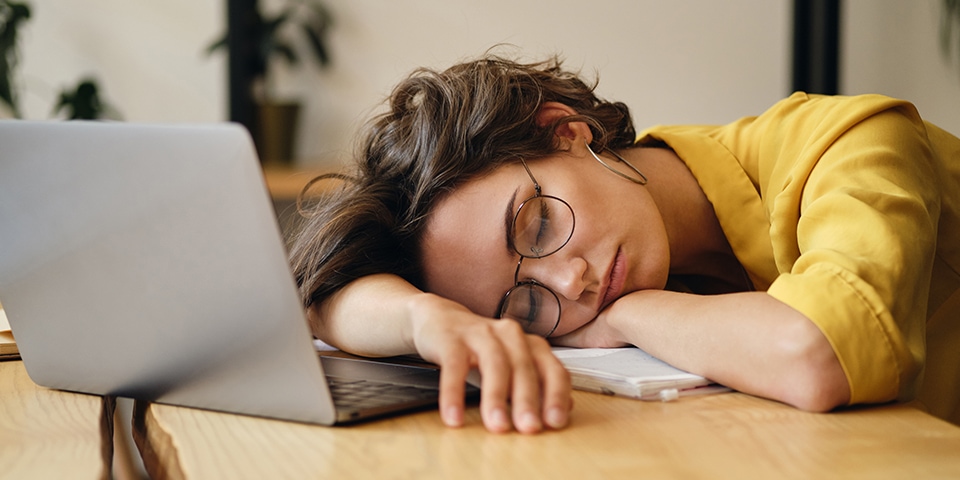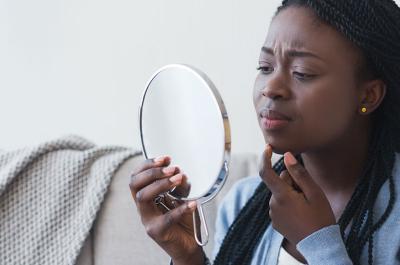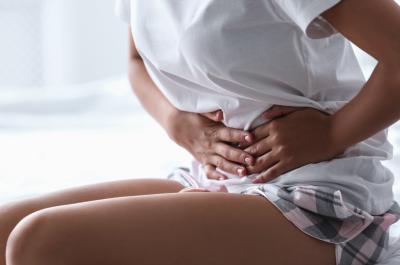How to feel better on your period

It’s no secret that your body changes when you menstruate, and most likely, the changes aren’t fun. Signs that AF (Aunt Flo) has arrived might include cramps, headaches, cravings and an intense desire to stay in bed for most of the day. If you’re looking for relief, look no further. Let’s talk about common Premenstrual Syndrome (PMS) symptoms, what causes them and a few hacks to make you feel better.
In this article
Period hacks for your symptoms
Period bloating
If your pants don’t button as usual during your period, you’re probably dealing with bloating. During this part of your menstrual cycle, changes in estrogen and progesterone levels can cause your body to retain more water and salt than usual.1 Your weight may fluctuate a few pounds, which should be a temporary symptom. But that doesn’t mean it’s any less uncomfortable!
Because your body might be retaining more water and salt than usual, try to drink a lot of water and avoid overly-salted foods or processed snacks. Try cutting down on your daily coffee intake while you’re on your period, both of which can be dehydrating if consumed in excess.2 All of these should help regulate your bloating.
Cramps
As your uterus contracts to help expel its lining, it can cause painful contractions, commonly known as period cramps. The pain may vary, but often includes throbbing pain in the lower abdomen, dull aches or discomfort that radiates to the lower back. Cramps can range from an inconvenient nuisance to a symptom that might make you feel like not leaving your couch or bed.
Aside from over-the-counter anti-inflammatory drugs, there are a few ways to get relief from cramps. Heat can help relax and soothe your body, whether it’s a heating pad, a hot-water bottle or a hot towel over the area in discomfort. Exercise might not be the first thing on your mind to treat cramps, but some light yoga can help relieve PMS symptoms.3 Try a few gentle poses on the floor throughout the day to show some love to your body and your mind.
If you have constant pain in the lower part of the abdomen during your periods that accompanies heavy bleeding, check with your doctor about menorrhagia.
Fatigue
Estrogen levels rise and fall during the menstrual cycle, and these changing hormones could be why you feel sluggish and tired throughout your period.4 It’s normal for your energy levels to dip when you’re on your period, but don’t go back to bed just yet. Doing some light exercise, like going on a walk or a leisurely bike ride, can help keep your energy up. The dehydration that contributes to bloating may similarly contribute to fatigue, so be sure to drink plenty of water.
If your energy levels don’t return to normal a few days after your period, or if your symptoms are extreme, check with your doctor about the possibility of other underlying conditions. Heavy bleeding is the most common cause of iron-deficiency anemia in women of childbearing age, which can make you feel abnormally tired or weak.5
Food cravings
Whether you turn to a bag of chips or a pint of ice cream, period cravings are a pretty common symptom. Often period cravings include sweets, carbs, or salty snacks, which could point to hormone fluctuations or nutritional deficits. For a more comprehensive breakdown on cravings — and what those cravings could mean — check out this post on common period cravings.
Balance is key; maintaining a healthy food routine is important for your body, but sometimes self-care means treating yourself to something indulgent.
Sleep disruption
Changes in hormones might make it difficult for you to fall asleep or sleep deeply.6 Hormonal changes before and during menstruation might disrupt your body temperature and melatonin production, also making it harder to sleep soundly.7
To help regulate your sleep cycle, avoid excess caffeine before and during your period. Try a relaxing bedtime routine with a heating pad and adjust the heating and cooling in your room to help regulate your body temperature. Exercising as you can during the day can also help you wind down at night.
Additional period tips
Here are a few additional ideas on how to feel better on your period:
- Change your eating schedule to six small meals a day (rather than three large ones) and add in some snacks. This will help keep your blood sugar levels stable and help with PMS.7
- Taking time to relax can relieve physical and mental strain of your period. Try breathing exercises, meditation or splurge on a professional massage.
- If you have depression or anxiety, those symptoms can worsen before or during your period.7 Give yourself grace and understanding during those influx of emotions. If you have a trusted therapist, set up an appointment around that time to make sure your mental health is a priority.
Every menstrual cycle is different, so your self-care should be customized to suit your symptoms. Finding what alleviates your PMS can help you function better physically and might meet your emotional needs during the discomfort.
7 questions about your period you’ve never dared to ask

Chances are that you learned the basics about your period sometime ago but not what you really want to know. And what you really want to know, you may be too embarrassed to ask.
Rest assured, you’re not the only one and we've got answers to seven (perfectly normal) period-related questions.
Sources
- Stachenfeld N. S., (2008), “Sex hormone effects on body fluid regulation”, Exercise and sport sciences reviews, https://www.ncbi.nlm.nih.gov/pmc/articles/PMC2849969/
- “Caffeine”, (September 2021), Medline Plus, https://medlineplus.gov/caffeine.html
- Vaghela, N., Mishra, D., Sheth, M., & Dani, V. B., (2019), “To compare the effects of aerobic exercise and yoga on Premenstrual syndrome”, Journal of education and health promotion, https://www.ncbi.nlm.nih.gov/pmc/articles/PMC6852652/
- “Physical activity and your menstrual cycle”, (February 2021), The Office on Women's Health, https://www.womenshealth.gov/getting-active/physical-activity-menstrual-cycle
- “Your menstrual cycle and your health”, (February 2021), The Office on Women's Health, https://www.womenshealth.gov/menstrual-cycle/your-menstrual-cycle-and-your-health
- Sharkey, K. M., Crawford, S. L., Kim, S., & Joffe, H., (2014), “Objective sleep interruption and reproductive hormone dynamics in the menstrual cycle”, Sleep medicine, https://pubmed.ncbi.nlm.nih.gov/24841109/
- Lee, K. A., Shaver, J. F., Giblin, E. C., & Woods, N. F., (1990), “Sleep patterns related to menstrual cycle phase and premenstrual affective symptoms”, Sleep, https://pubmed.ncbi.nlm.nih.gov/2287852/
- “Premenstrual Syndrome (PMS)”, (May 2021), The American College of Obstetricians and Gynecologists, https://www.acog.org/womens-health/faqs/premenstrual-syndrome




